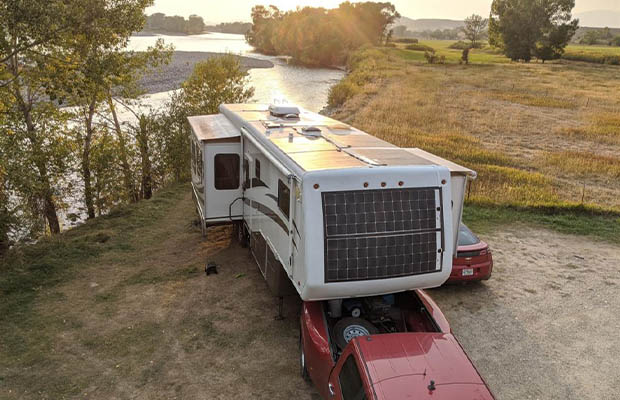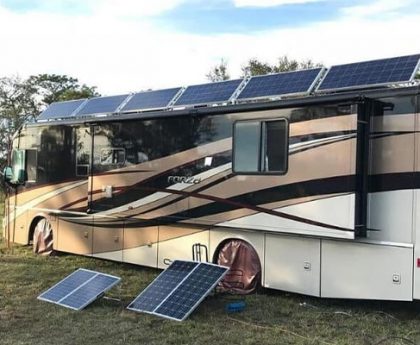Have you given any thought to using solar energy to recharge the batteries in your RV? Many of your issues can be resolved and a significant amount of money can be saved by installing solar on your RV.
Let’s look at how to charge RV batteries with solar and maintain battery power for your RV in this article.
Table of Contents
What is An RV Solar Battery Charger?
Your RV batteries can be charged using solar energy with the help of an RV solar battery charger system. This actually applies to just about any RV solar system you hear about. Although RV solar systems can be intimidating, each and every one of them serves the same fundamental purpose: charging your RV’s batteries.
If you do not connect to a power source (e.g. shore power or generator), your Your RV runs entirely on batteries. Your refrigerator, furnace, lights, and any other electronics won’t operate if your batteries aren’t charged properly. Many people try to use solar energy to charge their RV batteries almost anywhere because it’s important to keep batteries charged.
You May Also Like: Solar Panels For RV
Can You Charge the RV Batteries Using Solar Panel?
Using solar power or solar panels to charge RV batteries is possible. And contrary to popular belief, it is simpler. The panels can be easily installed on top of the RV and connected directly to the battery via a controller to start charging it.
The direct operation of your appliances by solar panels is not possible. A typical misunderstanding about RV solar panels is that. The energy must first be stored in batteries before being used.
It can be used to power both AC-powered and DC-operated appliances, such as lights, when using an inverter.
You can set things up in a variety of ways. First, let’s look at a straightforward method that requires little money and effort.
Related Reading: How Much Solar Power Do I Need for My RV?

RV Battery Type Considerations
Considering that all RV solar systems function as battery chargers, let’s examine the various battery types that can be installed in RVs.
Lead-Acid Batteries
Lead-acid batteries were the only practical energy storage option for automobiles and recreational vehicles for a very long time. In these batteries, electrons are stored and then released for use through a chemical reaction between an acid electrolyte and a metal (lead). These batteries fall into two categories: flooded and AGM. Let’s quickly review these two categories.
Flooded Lead-Acid: The majority of cars start their engines with these batteries, which are the most prevalent kind. Flooded lead-acid batteries require routine maintenance to ensure that their electrolyte is kept full. Furthermore, they need to be kept in ventilated areas where you won’t be exposed to the fumes because they release corrosive and flammable gasses when charging.
AGM (Absorbed Glass Mat): AGM batteries are lead-acid batteries with the added benefit of not requiring any maintenance. AGM can be installed in enclosed spaces or in habitations because they don’t release harmful gases. They do cost more than flooded lead-acid batteries, though.
Lead-acid batteries are typically affordable but require very particular charging procedures to maintain their health. Most RVers can expect a set of lead-acid batteries to last between one and three years with regular use. Lead-acid batteries have one very significant limitation that must be kept in mind: they can only be fully discharged once per use. If not, they sustain damage. It is crucial to give them a daily full charge. Unfortunately, a solar charger frequently fails to achieve this, so a generator may be required. Flooded cells also require routine equalization that raises the voltage to balance the cells.
Lithium Batteries
The most recent technology for storing energy in an RV is lithium-based batteries, which have many advantages over lead-acid batteries. These batteries can store about 4 times as much power for the same amount of weight as lead-acid batteries and will typically last 5 to 10 times longer than lead-acid batteries. Furthermore, they do not have strict charging requirements, can be discharged to the lowest level necessary, and do not require daily recharge.
These batteries are by far the best kind to use in a solar charger system, but they are more expensive up front. Fortunately, one lithium battery can typically replace four lead-acid batteries and will last a lot longer. In the long run, these batteries will cost less and spare you headaches. Due to their superior quality and top-notch customer service, we suggest Battle Born Batteries.
Battery Energy Ratings: In order to measure capacity, deep cycle batteries for RVs are measured in amp hours. Based on how many amps the battery should be able to discharge in an hour, this rating is given. Battery capacity comparisons, however, are not apples to apples. This is due to the fact that a lithium battery can deliver its entire capacity, as opposed to a lead-acid battery, which can only deliver 50–60% of its rated capacity.
FAQs
Can I Charge My RV Battery With Solar Panel?
The short answer is yes, a solar panel can be used to charge a RV battery. In order to know how much power needs to be replaced, you must first determine how much you used. Your heater will have a wattage or amp rating.
What Size Solar Panel Do I Need to Charge My RV Battery?
As a general rule, a 100 watt solar panel charges your batteries with 30 amp-hours per day. So you would need 1.33 100 watt panels, or one 133 watt panel to match your solar power needs.
How Long Does It Take to Charge a RV Battery With a Solar Panel?
When the sun is at its strongest during the day, a 100W solar panel, like the Renogy 100W (I have two of these), produces about 6 amps per hour (6-80 watts). So if you have a 100Ah RV battery, you can charge 50% of it in a little over 8 hours (50Ah/6A=8.33).
Final Words
You can use clean solar electricity to recharge your RV battery in even the most remote off-grid locations by purchasing a solar generator and one or more solar panels. Without taking up much space inside your RV, solar generators provide you with convenience and dependability.
A solar generator is the ideal piece of equipment for people who are new to solar energy because of its simplicity.
We encourage you to get in touch if you have any additional questions about using a solar generator to charge RV batteries or any other inquiries about solar energy. We are always available to assist you in starting to use solar energy!





